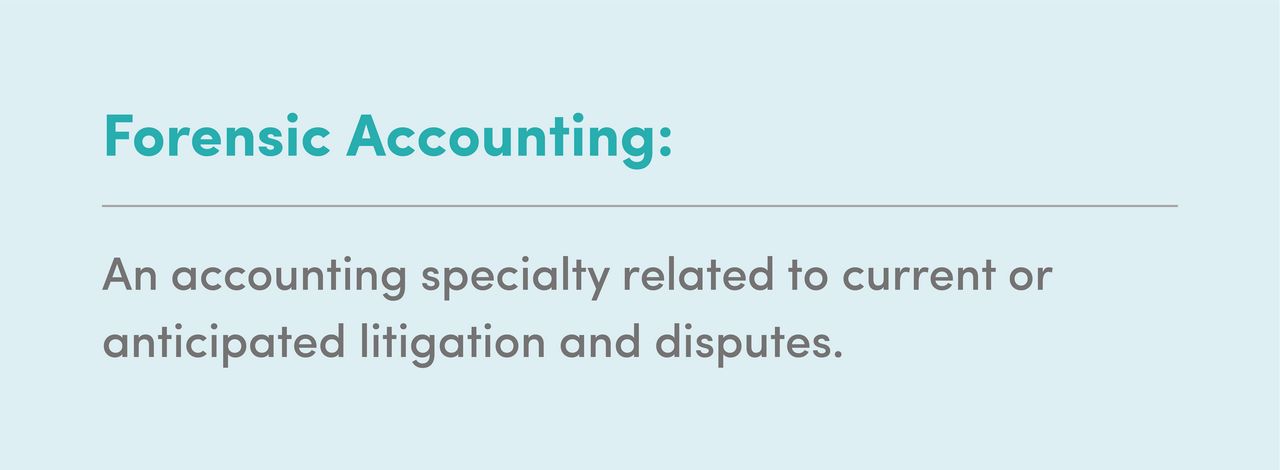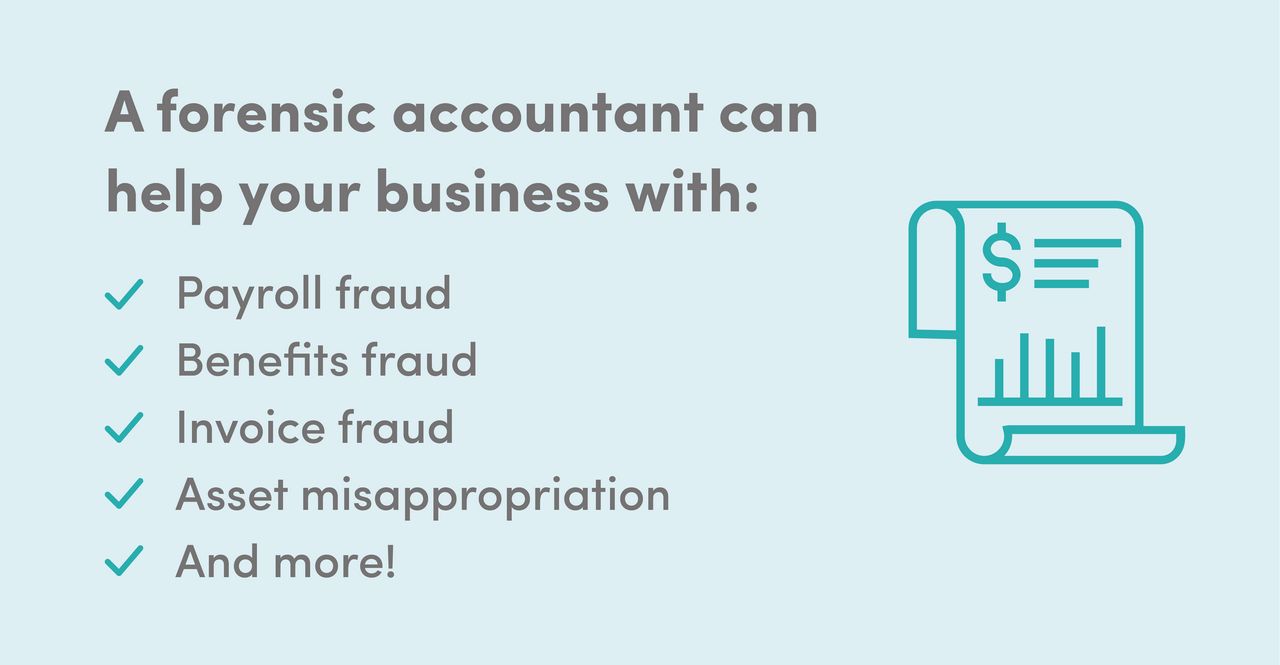Written by: nablasol
According to a biannual report conducted by the Association of Certified Fraud Examiners (ACFE), businesses that experienced fraud lost a median amount of $125,000. On average, it took 14 months to detect the ongoing fraud, and more than half of these businesses didn’t recover a single cent. And with the margins tight as they are, fraud can easily prove ruinous to an unsuspecting small business. Luckily, there is an approach business owners can take to tracing fraud and even preventing it before it happens — forensic accounting.
Put simply, forensic accounting is a special type of accounting related to current or anticipated litigation and disputes. Accountants conduct forensic accounting under the knowledge that their findings will be used in court — hence, “forensic” — when the court wants to determine damages. For example, during litigation over a compensation dispute, the court may utilize a forensic accountant as an expert witness.

Forensic accounting has its uses beyond litigation; criminal courts may utilize forensic accountants in cases of fraud or embezzlement.
Using a combination of accounting, auditing, and investigative skills to analyze and interpret complex financial variables, forensic accountants seek to trace funds, identify and recover assets, and establish damages from claims. Forensic accountants also may quantify non-transactional damages, such as those arising from non-disclosure agreement breaches or trademark infringements. During divorce litigation, a forensic accountant may scrutinize financial transactions to uncover hidden assets or violations of contract.

Forensic accountants must be comfortable with public speaking and preparing and presenting data; as previously mentioned, a forensic accountant may be called upon in court as an expert witness. The accountant must aggregate and analyze data before synthesizing it into an easily understandable visual aid when this happens. Then, during the court date, the accountant must present this data in a concise and easily digestible manner.

There are several industries that typically make use of forensic accountants, including:
The insurance industry is one of the most common employers of forensic accountants. When a client makes a claim, be it for an automobile accident, medical malpractice, negligence, or something else, the forensic accountant’s job is to quantify the resulting financial damages.
Some police departments employ forensic accountants dedicated to criminal matters. These accountants investigate claims of criminal fraud and serve as expert witnesses in criminal court.
The FBI employs forensic accountants to investigate federal financial crimes such as check fraud, credit card fraud, mortgage fraud, bank fraud, and more. The Securities and Exchange Commission (SEC) employs forensic accountants to investigate market manipulation and insider trading. In addition, the Treasury Department employs forensic accountants through the IRS to crack down on tax evaders.
Public accounting firms employ forensic accountants for use in litigation, typically divorce or non-business-related matters. During divorce proceedings, these accountants seek to find hidden assets or financial breaches of contract. In other contexts, public forensic accountants may seek to quantify damages in civil court.

As the 2008 financial crisis raged, many Americans were reeling from the blow. However, Bernie Madoff was not; the rogue financier had been defrauding investors out of more than $10 billion over the past 17 years. Unbeknownst to Madoff at the time, however, forensic accountants were putting the finishing touches on an irrefutable mountain of evidence against him.
Using masterfully-fabricated claims, Madoff attracted thousands of investors to his scheme. Then, in a Ponzi-style fashion, Madoff used capital from new investors to pay off old investors seeking to cash out. As long as Madoff could find new investors, his scheme could continue. However, when the markets crashed, his scheme crashed with it. Forensic accountants had all the evidence they needed for a conviction. For decades, Madoff made off with an eye-watering sum of money — and he was handed an eye-watering sentence to go along with it. Courts ordered Madoff to serve 150 years in prison and forfeit over $170 billion in assets.
In the 1920s, the FBI spent years trying to take down notorious mobster Al Capone. Known for running illicit businesses such as speakeasies, distilleries, and gambling rings, he meticulously covered his tracks, making conviction nearly impossible in a court of law. Due to his diligence, he was able to freely operate his criminal empire. However, forensic accounting ended up being the mobster’s undoing; over two years, IRS accountants collected evidence that Capone wasn’t paying taxes on his illicit income and spending dirty money. After collecting enough irrefutable evidence, Capone was tried and imprisoned for tax evasion, shattering his racketeering network.
Since the ’80s, energy company Enron had been committing fraud; the C-suite worked together with the accounting team to stash millions of dollars in debt from sight. However, this web of lies came undone in 2001 when Enron’s share price collapsed from $90 to just $1 in just a year. Sensing suspicious activities, the SEC decided to open an investigation. SEC forensic accountants pored over Enron’s financial statements, bringing the corporation’s “creative” accounting techniques to light — hiding debt in partnerships, intentional misinterpretations of financial records, and stock inflation, to name a few. After conducting a criminal investigation, the court convicted Enron CEO and COO Jeff Skilling on several felony fraud charges and sentenced him to 24 years in prison, although this was later reduced to 14 years. In addition, former Enron CEO Kenneth Lay was convicted of ten counts of securities fraud, although the judge vacated Lay’s convictions upon his death.
While the notable cases mentioned above entail unthinkable sums of money, the reality is that most fraud cases happen on a smaller scale. Unfortunately, with median losses of $125,000, it is still enough to cripple a small business. If you find yourself falling victim to payroll fraud, benefits fraud, or any other type of business fraud, hiring forensic accountants to track down and recoup fraud damages is essential.
To prevent fraud from happening in the first place, however, you must take a proactive approach to your accounting. Hiring experts to manage your small business bookkeeping services, such as the professionals at FinancePal, is crucial for having clear, concise, comprehensive, and correct financial statements that can protect your business — and your assets — from fraud.

Jacob Dayan is a true Chicagoan, born and raised in the Windy City. After starting his career as a financial analyst in New York City, Jacob returned to Chicago and co-founded FinancePal in 2015. He graduated Magna Cum Laude from Mitchell Hamline School of Law, and is a licensed attorney in Illinois.
Jacob has crafted articles covering a variety of tax and finance topics, including resolution strategy, financial planning, and more. He has been featured in an array of publications, including Accounting Web, Yahoo, and Business2Community.

Nick Charveron is a licensed tax practitioner, Co-Founder & Partner of Community Tax, LLC. His Enrolled Agent designation is the highest tax credential offered by the U.S Department of Treasury, providing unrestricted practice rights before the IRS.
Read More
Jason Gabbard is a lawyer and the founder of JUSTLAW.

Andrew is an experienced CPA and has extensive executive leadership experience.
Discussed options for my business with Brian and he was very helpful in suggesting how best to handle it.
Contact us today to learn more about your free trial!
By entering your phone number and clicking the "Get Custom Quote" button, you provide your electronic signature and consent for FinancePal to contact you with information and offers at the phone number provided using an automated system, pre-recorded messages, and/or text messages. Consent is not required as a condition of purchase. Message and data rates may apply.
By entering your phone number and clicking the “Get Started” button, you provide your electronic signature and consent for FinancePal to contact you with information and offers at the phone number provided using an automated system, pre-recorded messages, and/or text messages. Consent is not required as a condition of purchase. Message and data rates may apply.
